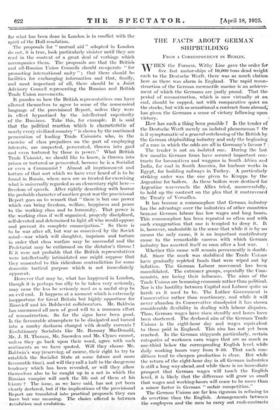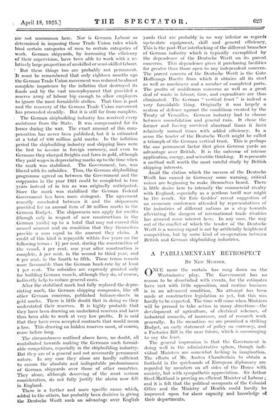THE FACTS ABOUT GERMAN SHIPBUILDING
FROM A CORRESPONDENT IN BERLIN.
WHEN the Furness, Withy Line gave the order for five fast motor-ships of 10,000 tons dead weights each to the Deutsche Werft, there was as much elation here as there was alarm in England. The rapid recon struction of the German mercantile marine is an achievement of which the Germans are justly proud. That the period of reconstruction, which is now virtually at an end, should be capped, not with comparative quiet on the stocks, but with so sensational a contract from abroad;' has given the Germans a sense of victory following upon victory.
How has such a thing been possible ? Is the tender of the Deutsche Werft merely an isolated phenomenon ? Or is it symptomatic of a general outclassing of the British by . the German shipbuilding industry and only the beginning of a race in which the odds are all in Germany's favour ?
The tender is not an isolated one. During the last few months German firms have secured important contracts for locomotives and waggons in South Africa and India, for coal in South America, for harbour works in Egypt, for building railways in Turkey. A particularly striking order was the one given to Krupps by the Argentine for boilers. As these boilers were destined for Argentine war-vessels the Allies tried, unsuccessfully, to hold up the contract on the plea that it contravened the Treaty of Versailles.
It has become a commonplace that German industry has the advantage over the industries of other countries because German labour has low wages and long hours. This commonplace has been repeated so often and with such exaggeration that one is tempted to deny it. It is, however,. undeniable in the sense that while it is: by no: means the only cause, it is an important contributory cause to the remarkable success with which German industry has asserted itself so soon after a lost war.
Whether this cause will remain permanently is doubtful. Since the mark was stabilized the Trade Unions. have gradually repleted funds that were wiped out by inflation. The German Labour movement has been consolidated. The extremer groups, especially the Communists, are losing their influence. The aims of the Trade Unions are becoming economic rather than political. Nor is the hostility between Capital and Labour quite so harsh as it used to be. The Luther Government is Conservative rather than reactionary, and while it will never abandon its Conservative standpoint it has shown considerable flexibility in dealing with labour disputes. Thus, German wages have risen steadily and hours have been shortened. The declared aim of the German Trade Unions is the eight-hour day and wages equivalent to those paid in England. This aim has not yet been reached. In the German shipyards particularly, certain categories of workmen earn wages that are as much as one-third below the corresponding English level, while daily working hours vary from 9-10. That such conditions tend to cheapen production is clear. But while the return of the eight-hour day in all German industries is still a long way ahead, and while there is no immediate prospect that German wages will touch the English level, it is likely that the difference will grow so small that wages and working-hours will cease to be more than a minor factor in -German "unfair competition."
The German Unions are far less rigorous in refusing to do overtime than the English. Arrangements between . the employers and-the men to carry out rush-contracts are not uncommon here. Nor is German Labour so determined in imposing those Trade Union rules which bind certain categories of men to certain categories of work. German shipyards, by increasing the efficiency of their supervision, have been able to work with a relatively large proportion of unskilled or semi-skilled labour. P But these things too are probably not permanent. It must be remembered that only eighteen months ago the German Trade Union movement was reduced to almost complete impotence by the inflation that destroyed its funds and by the vast unemployment that provided a reserve army of labour big enough to allow employers to ignore the most formidable strikes. That time is past and the recovery of the German Trade Union movement has proceeded steadily. But it is still far from complete.
The German shipbuilding industry has received every assistance from the State. It was compensated for its :losses during the war. The exact amount of this compensation has never been published, but it is estimated at a total of 650 minion gold marks. In the inflation period the shipbuilding industry and shipping lines were the first to invoice in foreign currency, and even to Germans they charged freights and fares in gold, although they paid wages in depreciating marks up to the time when the mark was stabilized. The Government, too, was 'liberal with its subsidies. Thus, the German shipbuilding 'programme agreed on between the Government and the coppanies in the year 1921 could be completed in two years instead of in ten as was originally anticipated. :Since the mark was stabilized the German Federal 'Government has been more stringent. The agreement recently concluded between it and the shipowners provided for an annual item of 50 million marks in the , German Budget. The shipowners can apply for credits (though only in respect of new constructions in the :German yards) up to a total that may not exceed this 'annual amount and on condition that they themselves ,provide a sum equal to the amount they claim. A credit of this kind is repayable within five years on the following terms : 11 per cent. during the construction of the vessel, 4 per cent. one year after construction is ;complete, 5 per cent. in the second to third year, and 6 per cent. in the fourth to fifth. These terms remain more favourable than the German bank-rate by at least 1 per cent. The subsidies are expressly granted only for building German vessels, although they do, of course, indirectly help to reduce general costs.
After the stabilized mark had fully replaced the depreciating mark, the German shipping companies, like all other German concerns, published balance-sheets in gold marks. There is little doubt that in doing so they understated their reserves. It is highly probable that they have been drawing on undeclared reserves and have thus been able to work at very low profits. It is said that they have even accepted contracts that would mean a loss. This drawing on hidden reserves must, of course, c ease before long.
The circumstances outlined above have, no doubt, all contributed towards making the Germans such formidable competitors, especially in the shipbuilding industry. But they are of a general and not necessarily permanent nature. In any case they alone are hardly sufficient to ensure the absolute and indisputable predominance of German shipyards over those of other countries. They alone, although deserving of the most serious 'consideration, do not fully justify the alarm now felt in England. There is a further and more specific cause which, added to the others, has probably been decisive in giving the Deutsche Werft such an advantage over English yards that arc probably in no way inferior as regards up-to-date equipment, skill and general efficiency. This is the post-War interlocking of the different branches of German industry which is typically exemplified by the dependence of the Deutsche Werft on its parent concerns. This dependence gives it purchasing facilities far greater than those open to any independent concern. The parent concern of the Deutsche Werft is the Gute Hoffnungs Huette from which it obtains all its steel as well as machinery and a number of completed parts. The profits of middleman concerns as well as a great deal of waste in labour, time, and expenditure are thus eliminated. The German "vertical trust" is indeed a very formidable thing. Originally it was largely a system of defence against the conditions created by the Treaty of Versailles. German industry had to choose between consolidation and general ruin. It chose the former and having survived abnormal times it faces relatively normal times with added efficiency. In a sense the tender of the Deutsche Werft might be called a triumph of the German vertical trust. This is perhaps the one permanent factor that gives German yards an advantage over British. It is the outcome of intense application, energy, and scientific thinking. It represents a method well worth the most careful study by British shipping interests.
Amid the elation which the success of the Deutsche Werft has caused in Germany some warning, critical voices are beginning to make themselves heard. There is little desire here to intensify the commercial rivalry with England, especially as a perilous tariff war might be the result. Sir Eric Geddes' recent suggestion of an economic conference attended by representatives of the industries of different nations as a step towards alleviating the dangers of international trade rivalries has aroused some interest here. In any case, the way out of the conflict of which the tender of the Deutsche Werft is a warning signal is not by artificially heightened competition, but by some kind of co-operation between British and German shipbuilding industries.











































 Previous page
Previous page